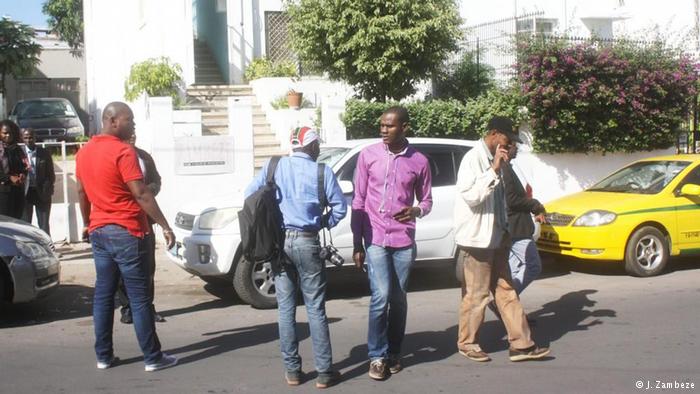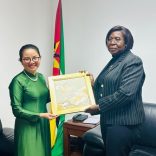Mozambique: Mondlane hits back at claim that election protests did more damage than civil war
Lawyer criticises Mozambican journalists’ “illegal” notification

DW / Authorities take the director and chief editor of the Zambeze newspaper to testify before the Criminal Investigation Police, PIC
Mozambican lawyer Gilberto Correia says that compulsory notification to testify served on the management of the Zambeze weekly did not respect legal procedures, and had turned the notification procedure into “an arrest warrant”.
Police went twice this week to the premises of the weekly Zambeze in Maputo. On their first visit on Monday the director of the newspaper, João Chamusse, was not on the premises. The director of the weekly Zambeze is adamant that the police left no notification at the newspaper office on that occasion.
They returned on Tuesday. According to Chamusse, “They showed up between 9 and 10 o’clock with notifications, which needed to be signed. When asked whether it was possible to change the date because it was the newspaper’s closing day, the men said that it would be best to go to the PIC [Criminal Investigation Police] immediately. As it was not convenient for us, we opted for 12 o’clock. They told us ‘All right, but we’ll be down there waiting for you’. They were in civilian clothes, about eight of them. And they were in private cars”.

The newspaper’s editor-in-chief, Egidio Plácido, was also compulsorily notified.
Only later did Chamusse realize that that legal procedure had not been followed, in two respects: firstly in that the pair were obliged to go to the PIC immediately, and secondly that they were taken there by the police.
Five-day deadline was not met
“The notification is not immediately compliant,” explains lawyer Gilberto Correia. “Usually there must be a period of five days between the receipt of the notification and the appearance or attendance. I admit that there may be some urgency, but this period can never be reduced to the point of immediacy.”
“The person served has the right to be represented by a lawyer, and if the notification is immediate, how can that person prepare a defence?”
The lawyer is in no doubt. “What happened here was an illegal attitude, trying to turn a mere notification to call someone to testify at the PIC into an arrest warrant. The very fact of saying ‘we’ll wait here’ means that those individuals could not go anywhere else without being accompanied by police.”

Director only learned of the reasons at PIC
According to Chamusse, the plain-clothes policemen demanding his immediate appearance before the Criminal Investigation Police did not know the reason for the notification, which only became apparent on the fifth floor of the PIC offices.
“The subject [of the questioning] was two articles that we published in the last edition on the political and military conflict situation in the central region [of the country]. In the texts, we wrote about four Zimbabwean soldiers who were supposed to have been killed, information that we picked up from a Zimbabwean newspaper, which we quoted.”
The other item referred to complaints by the area’s residents about atrocities allegedly committed by government forces.
Over about two hours of questioning, the PIC sought to establish the sources of these complaints. Chamusse sees this as the police attempting to intimidate his newspaper into not reporting complaints relating to the war between government forces and the armed wing of the largest opposition party, Renamo.
Voices of concern
On Wednesday (June 15), the Media Institute of Southern Africa in Mozambique condemned the attitude of the authorities.
“MISA Mozambique notes with concern the pressure put on journalists to disclose their sources of information in recent interrogations,” their statement reads
In May, the Lusa correspondent in Mozambique, Henrique Botequilha, and a news agency colleague in the centre of the country, testified before a parliamentary committee on the case of the alleged mass graves in the region and bodies scattered in the bush there.
Lawyer Gilberto Correia points out that the practice of compulsory notification is quite common in Mozambique. “The police, who no longer have the power to arrest since a ruling by the Constitutional Council saying that only the judicial authorities may make arrests, do this very often. And this is known by the highest authorities.”












Leave a Reply
Be the First to Comment!
You must be logged in to post a comment.
You must be logged in to post a comment.